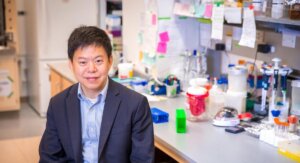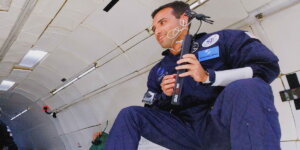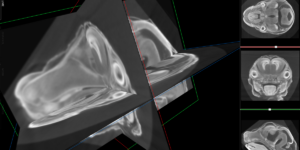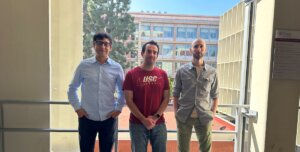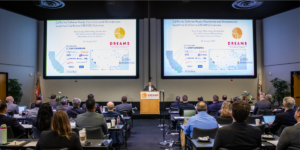
Mike Gruntman, professor of Astronautics, Trina Gregory, associate professor of Information Technology Practice, and Jonathan Messer, M.S. ’18, speaking during a panel moderated by Kelly Goulis, senior associate dean for admission and student engagement, at the DEN@Viterbi 50th anniversary event
For many educational institutions, the adjustment to virtual classes during the pandemic was a steep learning curve. The prevailing viewpoint was that student engagement, interaction and effective pedagogy was best fostered in the classroom – but faculty members at USC Viterbi School of Engineering knew better. In fact, they’ve been perfecting the art of technology-enhanced distance learning for half a century. This year, DEN@Viterbi, USC Viterbi’s Distance Education Network, marks its 50th anniversary.
On 21 September, faculty members, students and DEN ambassadors – alumni who have profited from the program – gathered to celebrate the unique features of DEN and to contemplate the imminent advances of the next 50 years.
As the world’s first technologically delivered graduate engineering program, DEN started life in the early 1970s as a series of courses delivered by the Instructional Television Network (ITV). By the 1980s, video tapes were being delivered to students across the U.S., and in the late 1990s the program made the leap to satellite broadcasts, and soon to webcasts via the internet.
Today, DEN@Viterbi offers 41 master’s degrees and 5 graduate certificates to more than 1,000 international and professional students annually – from engineers in corporate roles looking to deepen their knowledge, to veterans planning to transition to civilian life, and even to students in war zones determined to change their circumstances and create a better world. National publications have repeatedly named DEN among the best online engineering education programs in the country.
“DEN has been the gold standard of university distance education networks since its founding,” said Dean Yannis C. Yortsos. “In the future, DEN hopes to add artificial intelligence (AI) and augmented reality (AR) to enhance the learning experience.”
Associate Dean Binh Tran provided the welcome address during the 50th anniversary event program and focused on the history of DEN, where DEN is today, and what the future holds. “We are in a position to significantly increase our instructional services to the Viterbi School and USC,” he annouced. “We are overseeing classroom infrastructure upgrades and instructional services to provide more students with access to better learning experiences.
This expansion allows us to support more educational and research initiatives across the school and university, incorporating advanced research and computing in ways we couldn’t have imagined 10 years ago.” Tran reinforced comments made by Yortsos about the excitement of integrating AI and AR into DEN programs, as well as the role of USC Frontiers of Computing and the new School of Advanced Computing in advancing the future of DEN and the university as a whole.
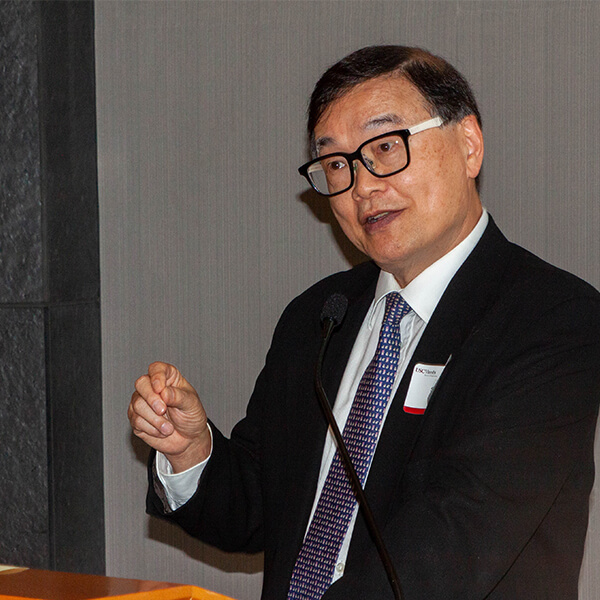
Stephen Lu, David Packard Endowed Chair Professor in Manufacturing Engineering, speaking at the DEN@Viterbi 50th anniversary event
The future of DEN has also been on the mind of Stephen Lu, David Packard Endowed Chair Professor in Manufacturing Engineering. Lu directs the iPodia@Viterbi global education program; under his leadership, iPodia has grown to 17 schools from around the world including universities in Israel, Greece and China. Lu is also the founding director of IMPACT (Improving Productivity via Advanced Collaboration Technology) research laboratory at USC.
Speaking at the event, Lu drew attention to what he calls the “existential crisis” of higher education institutions. If educational content is widely and freely available online, then what added value can universities offer? “By developing unique curricula and learning environments where students from diverse backgrounds can learn together, we offer not only content but context,” Lu explained.
“As a scientist, you need to understand content. But as an engineer, you need to apply that knowledge in context. Learning alongside others from all across the world provides unprecedented insights into a multitude of contexts and the challenges faced in different circumstances. The space of the university is changing from the ‘ivory tower’ lecture hall, to every student’s gateway to the world.”
In a panel discussion, Mike Gruntman, professor of Astronautics, and Trina Gregory, associate professor of Information Technology Practice, demonstrated how those far-reaching ambitions are being put into practice. Gruntman, who grew up in the former Soviet Union, pioneered a life-changing, free, online masters-level astronautics course to students in Ukraine – students for whom the stress of coursework was nothing in comparison to the traumas of war.
“In the past, the country had an industry that produced numerous rockets and space launchers and built more than one thousand satellites,” said Gruntman. “Ensuring that expertise is maintained and preserved during wartime isn’t only a matter of morale and practicality. It will help post-war reconstruction of the country and contribute to a necessary deterrent against invasion in the future. Space is increasingly a battlefield, and students from Ukraine have the right to use their skills and to change the fate of their country.”
Gruntman also noted that a high degree of sensitivity is necessary when conducting the course – students have been subject to unimaginable personal losses, with family and friends losing their lives on the front line. Sensitivity and compassion are also a priority for Gregory, who has used the DEN platform to teach coding and web development to young women in Afghanistan. During the anniversary event, a video broadcast from one of Gregory’s students expressed the tremendous impact of the online classes – complete with witty use of emojis. For these young women, barred from experiences that USC students on campus take for granted, learning to code isn’t just a checkbox to tick. It’s a ticket to freedom.
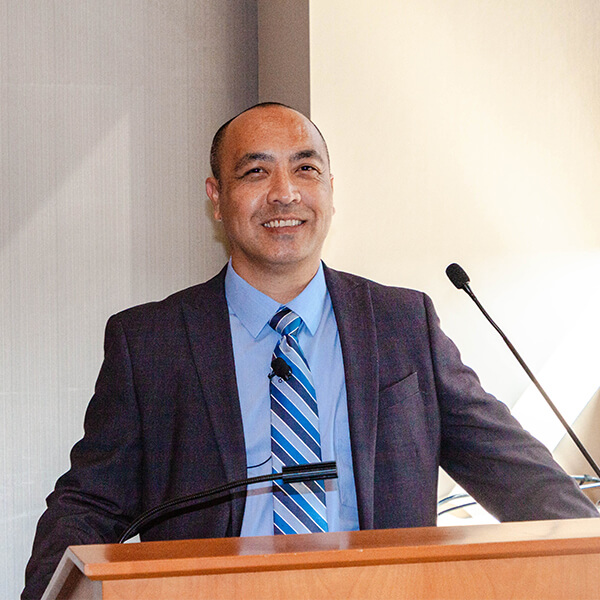
Associate Dean Binh Tran speaking at the DEN@Viterbi 50th anniversary event
Jonathan Messer, M.S. ’18, an alumni ambassador for DEN, might be considered more fortunate. However, as a space systems engineer at Northrop Grumman and a veteran naval aviator, he has undergone his fair share of trials. Studying systems engineering at USC allowed him to make a smooth transition from life in the military to the corporate world, and he credits the DEN master’s program in Systems Engineering with allowing him to “hit the ground running.”
“I owe a lot to Viterbi,” he said during a panel. “I briefly engaged in a naval postgraduate distance learning program, where all of my peers were fellow officers. I had initially planned to continue my education with the Airforce Institute of Technology, but then I discovered the program at USC. My first collaborative project involved people from competing companies working together – it was a truly diverse experience, and I strongly believe that officers in active duty can benefit from peers working in industry and civilians can likewise learn from officers and veterans.”
Gruntman agrees. “In my experience, individuals from a military background can benefit tremendously from DEN – especially our astronautics programs. If you’re retiring from the military and entering civilian life, you’re still going to be seeking a highly interesting, high stakes career. And what is better than space?”
Indeed, the opportunities offered by the school’s distance education network played an enabling role in launching the USC Astronautics program, contributing to the decision to establish an independent department in 2004. Back when DEN was in its infancy as ITV, interactive one-way video and two-way audio broadcasts were set up in classrooms at local aerospace companies such as Hughes, McDonnell Douglas, Rockwell, Burroughs, Jet Propulsion Laboratory, The Aerospace Corporation and many others. Two decades later, webcasting opened a way for small companies and individuals to enroll in DEN online programs. Today, astronautics students studying through DEN reside in many geographical areas with rocket and space activities, installations, test and operations sites, space companies and government centers.
The application of DEN in the context of astronautical engineering highlights the school’s commitment to cultivating close ties with industry partners and the power of mutual exchange of ideas. This principle is central to DEN@Viterbi – where distance learning isn’t just a pragmatic response to a changing world, but a technological opportunity that will continue to democratize and enhance education for all.
Published on September 28th, 2023
Last updated on April 11th, 2024




